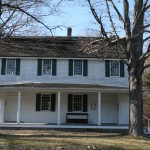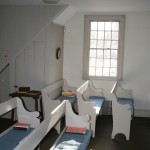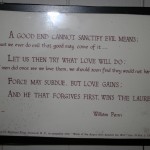
Meetings: Our Meeting for Worship is held every Sunday morning at 10:30 A.M., followed by friendly hospitality. Child Care for young children and Religious Education in the Quaker tradition for older children and young adults are provided except during the months of July and August.
Quaker Worship: Cornwall Monthly Meeting is an unprogrammed Meeting. This means that we have no priest or minister, and that we worship together in silence. Our meetings last about one hour.
Ordinarily Friends enter the building through the right-hand door a few minutes beforehand, greet each other in the common room, and then enter the next room and sit facing each other on the simple benches. Meeting for Worship begins when the first worshipper sits in silence, and begins to “center down” — that is, to still and direct one’s thought, and open one’s mind to attend the presence of God.
When all worshippers have entered and are silent, the Meeting for Worship is called “settled.” Soon afterwards, participants may feel a peculiar profundity in the silence, as the community is united. Friends refer to this phenomenon as the Meeting’s being “centered down,” or “covered.” Meeting for Worship ends when a worshipper turns to a neighbor and offers his or her hand in greeting.

Participants may sometimes break the silence to offer ministry. By tradition and discipline, however, Friends speak only when compelled by a sense of urgency; and a Friend who has offered a message will only rarely speak a second time in that Meeting. Messages are most valued when they are terse. Often it happens that a Friend speaks a thought that had been silently shared by others. Messages are retained and considered by each of the group, but not directly replied to. We do not debate each other while we worship.

Those unaccustomed to silent worship may at first find the experience boring, disjointed or confusing. Indeed, Friends themselves sometimes find some Meetings for Worship unsettling. Over time, however, deep bonds of spiritual respect and mutual support are created among the worshippers. Practically every Quaker treasures memories of particular Meetings for Worship that were entirely silent, yet during which untold quantums of faith and solace were exchanged.
True to Quaker tradition, the business of the Meeting is conducted in a monthly “Meeting for Worship with a Concern for Business.” Cornwall Meeting conducts its business at 9:00 a.m. on the third Sunday of every month. Friends convene in the Meeting Room. After a few minutes of silence, the Clerk of the Meeting raises topics of concern that require action by the group. These topics are considered by the entire Meeting. Views are expressed; the topic is “held to the Light.” Friends do not “vote” on corporate action, but rather seek a shared understanding of God’s will for us. Usually it is possible for the sense of the Meeting to be felt, and at that point someone (usually the Clerk) will propose a “minute” that attempts to articulate the sense of the group. Members may reflect their assent by saying “approve,” or by not speaking. A member opposing, but willing to recognize and abide the will of the group as the group perceives it, “stands aside.” A member who cannot accept the proposed action, however, “stands” on the issue. The Meeting then considers whether to proceed with the proposed action if any member “stands” against it, and very frequently will postpone rather than take action in the absence of unity.
When differences arise among Friends during Business Meeting — and they often do — a member may request silence to allow for a deeper communal search for God’s will. Such requests are always respected, and always fruitful (at least to some degree). If no unity is achieved despite members’ best efforts, the matter is postponed.
Quakerism does not have a “Book of Common Prayer,” a “Catechism,” or other source from which one may glean the absolute tenets of the faith. Certain Yearly Meetings do, however, publish and periodically revise a volume titled Faith and Practice: The Book of Discipline. As the name implies, it is divided into two parts.
The first part, “Faith,” sets forth information about the history of the Religious Society of Friends, certain testimonies common to most Quakers, and a set of “Advices” and “Queries.” These “Advices” and “Queries” come as close as Quakers get to religious instruction, and are couched as guides, or invitations to personal and communal self-assessment. They are broadly but pointedly phrased. For example, an “Advice” may be: “Friends are advised to read frequently the Scriptures and such other books as will inspire and instruct, and to encourage the practice by their families and others.” A “Query” may be: “Are love and unity fostered among us? If differences arise do we endeavor to reconcile them in a spirit of love and truth? Do we avoid talebearing and are we careful of the reputation of others?”
The second part, “Practice and Procedure,” sets forth the organization of Yearly Meetings, Quarterly Meetings and Monthly Meetings; procedures for the conduct of business; the manner of recordkeeping; the oversight of Monthly Meetings; and procedures for marriage, memorial, and other special events conducted within or under the care of the Monthly Meetings.
Friends sometimes find reading from Faith and Practice,The Bible, or other devotional works helpful in centering down during meeting. Copies of both are on the benches of our Meeting House, and other literature and materials are available. If you’re interested in further Quaker resources, please also see the page of Useful Links on this web site.
